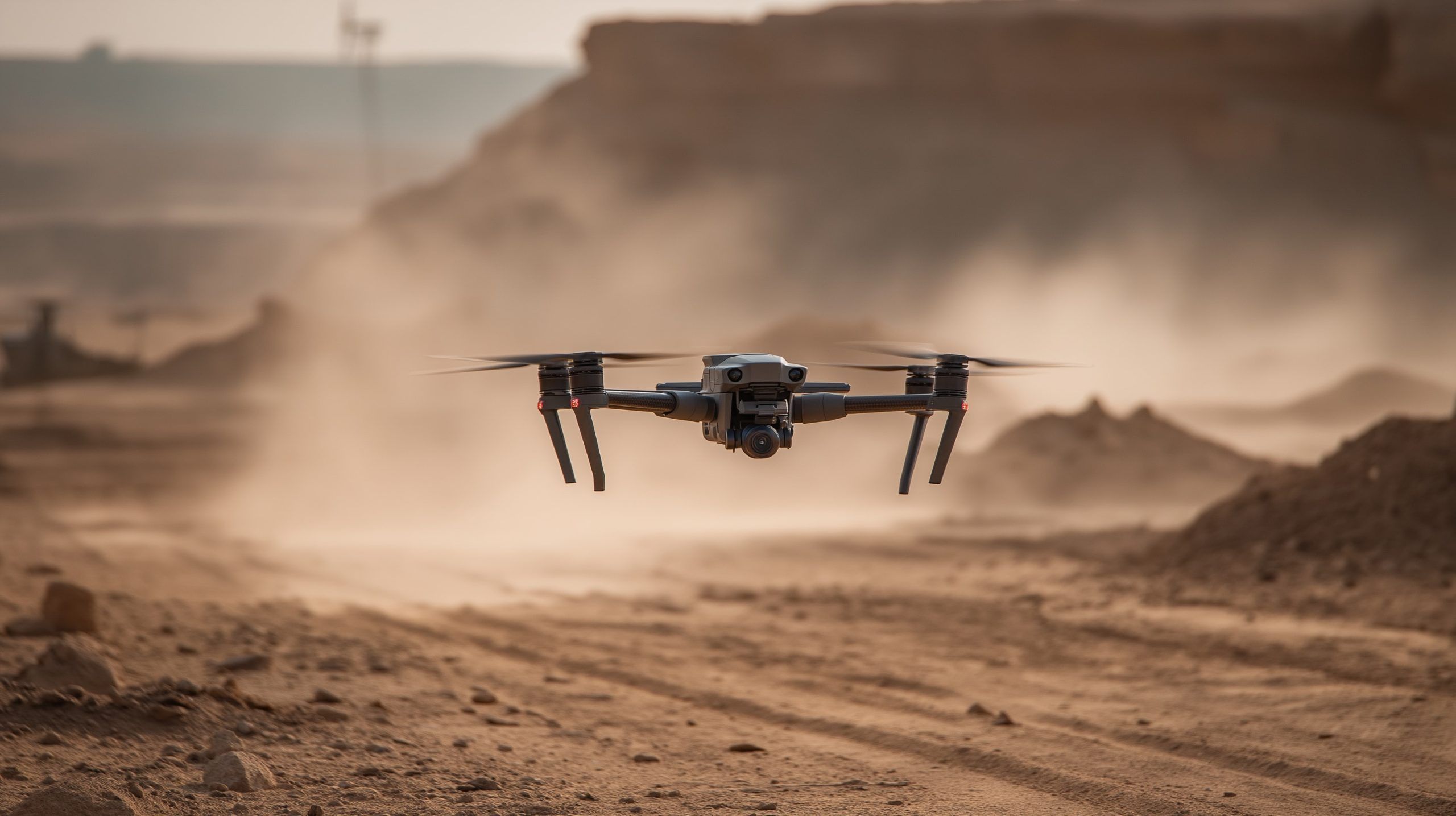- The Qatar Civil Aviation Authority (QCAA) is the primary agency regulating drone use in Qatar.
- Drone flights require prior authorization from the QCAA, and casual hobby flying is effectively prohibited without permission.
- Recreational drone use is limited to Qatari citizens and residents who obtain a QCAA permit, with tourists unable to fly.
- Drone registration has been mandatory for all drones since 1 October 2021, with separate forms for individuals, companies, and government entities.
- Commercial drone operations require a QCAA permit and registration by a Qatar-registered company, with proof of insurance mandatory.
- The maximum permitted altitude is 400 feet (approximately 120 meters), and operators must stay at least 1 kilometer away from airports or airfields.
- No-fly zones cover airports, military bases, and critical infrastructure, and operations are generally limited to daylight hours with visual line-of-sight.
- Privacy protections under Article 333 of the Penal Code prohibit photographing or recording people without consent, with penalties including up to 2 years in prison or a fine of up to QAR 10,000.
- Government and semi-government drone use is regulated under special frameworks, with police and military UAVs generally exempt from civilian rules and coordinating with air traffic.
- In January 2025 the Cabinet approved a draft national Drone Law that had not yet been enacted by mid-2025, while 2025 also saw announced electric air taxi trials and drone-delivery pilots.
Drones – also known as unmanned aerial vehicles (UAVs) – are heavily regulated in Qatar. The Qatar Civil Aviation Authority (QCAA) is the primary agency overseeing drone use in the country drone-laws.com. Drone operations are generally prohibited unless you have prior authorization from the QCAA, and Qatar maintains some of the strictest drone rules in the world drone-laws.com ts2.tech. In practice, casual hobby flying is nearly impossible without permission – only government entities or specially approved projects typically use drones in Qatar ts2.tech. This report details the regulations for recreational, commercial, and government drone use in Qatar, covering registration, licensing, no-fly zones, penalties, privacy concerns, and recent legal developments as of 2025.
Recreational Drone Use in Qatar
Recreational or hobby drone flying in Qatar is very restricted. Only Qatari citizens and residents are allowed to fly drones, and even they must obtain a permit from the QCAA before any flight uavcoach.com drone-laws.com. Tourists and foreign visitors are not permitted to fly drones; in fact, travelers attempting to bring a drone into Qatar without prior approval will likely have it confiscated at customs uavcoach.com.
Hobbyists who are Qatar nationals/residents must go through a strict approval process. In practice, recreational flying is typically limited to designated model aircraft clubs and fields. For example, the government-affiliated Qatar RC Sport Center requires hobby pilots to obtain a club license (with an annual fee) and limits recreational drone flights to approved RC airfields drone-made.com drone-made.com. Even with a hobby permit, pilots must follow all QCAA rules such as flying only in authorized areas and under specific conditions. General safety rules also apply to recreational users, including: not flying above 122 m (400 ft) altitude drone-laws.com, only flying in daylight good weather, keeping line-of-sight, and avoiding flights over people or sensitive locations drone-laws.com. In short, unless you have explicit permission and are flying in a controlled setting, leisure drone use is essentially off-limits in Qatar.
Commercial Drone Operations in Qatar
Commercial use of drones – for photography, surveying, inspections, etc. – is possible in Qatar but under very strict requirements. Any company or professional wanting to operate a drone must be Qatari-registered (foreign companies cannot simply bring in drones without a local entity) droneregulations.info. Prior approval from the QCAA is mandatory before conducting any commercial drone flight drone-laws.com. In practice, this means obtaining a commercial drone license/permit from QCAA and registering the drone (details on registration are in a later section).
Commercial operators need to submit detailed applications about their intended use. Typically, a letter describing the project and client, the exact flight location, date, and purpose is required drone-made.com. Security clearance may also be part of the process – for instance, Qatari authorities often coordinate with the Armed Forces for aerial photography missions. Reports indicate that for some commercial drone flights, the operator must notify the military in advance and even have a security officer present during the flight to supervise that only the approved activities are carried out drone-made.com. Additionally, commercial pilots must contact Air Traffic Control on the day of operation for final clearance before and after the flight drone-made.com.
While insurance is not explicitly mandated by law for commercial flights, QCAA does require proof of insurance before operating any drone droneregulations.info. All general safety rules (max altitude 400 ft, no flying over crowds, etc.) apply to commercial flights as well. Overall, commercial drone use is allowed only on a case-by-case basis with QCAA’s permission, and the process is thorough to ensure safety and security.
Government and Institutional Drone Use
Drone operations by government agencies or institutions (e.g. police, military, civil defense, and state-owned companies) are also regulated by QCAA, but these entities typically have more latitude under special frameworks. Government drones must be registered with QCAA like any other, using dedicated registration forms for governmental entities droneregulations.info. However, state agencies often operate under separate protocols or exemptions when it comes to using drones for official purposes ts2.tech. For example, police or security forces might deploy drones for crowd monitoring or emergency response under internal approvals rather than public permits.
In Qatar, government and semi-government institutions coordinate closely with QCAA and other authorities to ensure their drone operations do not conflict with air traffic. Military and law enforcement UAVs are generally exempt from the civilian drone rules that apply to hobbyists or businesses ts2.tech, but they will coordinate with air traffic control and follow security procedures. Notably, Qatar’s authorities have invested in counter-drone systems to protect sensitive areas (especially during major events like the 2022 World Cup) qatarloving.com. During such events, only officially authorized government drones were allowed, and unauthorized drones were actively disabled by security systems if flown near venues qatarloving.com. In summary, institutional use of drones is confined to government-approved purposes, with QCAA oversight to maintain airspace safety.
Registration and Licensing Requirements
Drone registration is compulsory in Qatar for any entity (individual, company, or government) wishing to operate a UAV. In fact, since 1 October 2021, all drones in Qatar must be registered with the QCAA droneregulations.info. The QCAA provides specific registration application forms for different categories: one for individuals (hobbyists), one for companies, and one for government/semi-government entities droneregulations.info. Registration involves providing details about the drone (make, model, serial number) and the operator.
When applying to register and license a drone, Qatar imposes several conditions and eligibility requirements droneregulations.info:
- Minimum Age – The drone operator must be at least 18 years old droneregulations.info.
- Nationality/Residency – Only Qatari citizens and residents are allowed to register or own drones. Authorization to operate is not available to tourists or short-term visitors drone-laws.com.
- Local Sponsorship – If a company is registering a drone, it must be a Qatar-registered company (local presence). Companies need to provide a Letter of Authorization describing the types of drone activities they intend to conduct droneregulations.info.
- Drone Limit per Owner – An entity (individual or company) may register a maximum of five (5) drones in total droneregulations.info. This rule prevents any one person or organization from stockpiling large fleets of UAVs without special permission.
- No Modifications – It is forbidden to modify or attach anything to the drone that was not part of its original design droneregulations.info. (In other words, you cannot jury-rig weapons, additional payloads, or unapproved equipment onto a drone.)
- Insurance – Liability insurance coverage is mandatory before operating a drone. Applicants must provide an insurance policy for the UAV to cover potential damages or accidents droneregulations.info.
Registering a drone with QCAA essentially licenses that drone for use under QCAA regulations. Additionally, drone pilots/operators may need to obtain a QCAA permit or license themselves. Qatar does not issue a standard “remote pilot license” like some countries do; instead, the QCAA’s operational permit (described below) serves as a de facto license to fly under specified conditions. Hobbyists flying at the RC club are granted a club license for recreational flying, whereas commercial operators receive a QCAA authorization specific to their project drone-made.com drone-made.com. In all cases, the operator must carry proof of the drone’s registration and any QCAA authorizations while flying.
Permits and Flight Approvals
Possessing a registered drone in Qatar is not enough – you must also obtain permission for any flight. The QCAA requires drone users to apply for an operational permit (sometimes called an RPAS flight authorization) before launching a drone drone-laws.com. Essentially, each drone flight or project needs to be vetted and approved by the authorities.
To get a permit, an operator must submit an application detailing when, where, how, and why the drone will be used. The QCAA’s “Remotely Piloted Aircraft System (RPAS) Operation Application” form needs to be filled out with information such as the flight location/map, dates and times of operation, altitude, drone model, and purpose of flight droneregulations.info. For commercial missions, additional documentation like a client’s request letter or a project proposal is typically required to justify the drone use drone-made.com. Government agencies likewise coordinate their drone operations through an approval process, although internally this may be streamlined.
All relevant bodies are consulted during permit approvals. For example, if filming outdoors, the Ministry of Interior or security authorities might be informed, and as noted, the Armed Forces often need to clear airspace use for drone activities drone-made.com drone-made.com. The QCAA has stated that processing a drone operation request can take up to 4 working days, so operators must apply well in advance caa.gov.qa.
Once granted, a QCAA drone permit will specify the exact parameters of the approved operation – including the location (and sometimes a geo-fenced area), maximum altitude, time window, and any observers or security measures required drone-made.com. Flying outside those parameters (e.g. in a different area or longer time than authorized) would violate the permit. It’s important to note that without a QCAA permit, any drone flight is considered illegal in Qatar drone-laws.com. Even transiting through Qatar with a drone in your luggage is regulated – if you stay within the airport transit area, no permit is needed, but you absolutely cannot leave the airport and fly the drone without prior approval drone-laws.com.
In summary, every drone operation in Qatar requires explicit QCAA approval. Hobbyists need permission for recreational flights (usually via the RC club and QCAA), and businesses need a project-specific permit. Always plan ahead for the permit process, and do not attempt to fly spontaneously – that could lead to serious consequences as outlined below.
No-Fly Zones and Airspace Restrictions
Qatar imposes strict no-fly zones and airspace restrictions to protect public safety, privacy, and sensitive infrastructure. Unless you have special permission, you should assume most areas are off-limits. Key drone restrictions include:
- Airports and Flight Paths – It is illegal to fly a drone anywhere near airports or aircraft flight routes. As a general rule, keep at least 1 km away from any airport or airfield and never fly in the approach/departure paths of planes gulf-times.com. Drones must stay well clear of Hamad International Airport in Doha and any other civil or military airfields.
- Maximum Altitude – Drones cannot be flown higher than 400 feet (~120 m) above ground level drone-laws.com. This altitude cap is in place to prevent conflicts with manned aircraft. Even with permission, QCAA will typically limit your allowed altitude.
- Urban and Residential Areas – Flying over populated city areas, residential neighborhoods, or over crowds of people is prohibited without special authorization drone-laws.com. Drones should not be operated above gathering of people (e.g. festivals, markets) or near busy public roads and buildings for safety and privacy reasons.
- Sensitive Sites – No-fly zones include military bases, security facilities, government buildings, and critical infrastructure. Drone pilots must avoid areas around power plants, water treatment plants, oil & gas facilities, communication towers, and similar infrastructure drone-laws.com. Flying near any military installation or border area is especially dangerous – authorities may assume a security threat and respond accordingly.
- Stadiums and Event Venues – During major events, temporary no-fly zones are declared. For instance, in the lead-up to the FIFA World Cup 2022, Qatar’s Security Committee explicitly banned drones around World Cup stadiums and sports facilities, and stated that any drone in those areas would be disabled and its operators subject to legal action qatarloving.com. In general, do not fly near sports stadiums, concert venues, or VIP events unless you have explicit clearance.
- Time of Operation – Drones in Qatar are only allowed to fly in daylight hours and good weather conditions drone-laws.com. Night flying is forbidden without special permission (which would be rare), and flying in high winds, rain, or dusty conditions is also discouraged for safety.
- Visual Line of Sight – Operators must keep their drone within visual line-of-sight (VLOS) at all times during flight. First-person view (FPV) flying or beyond-line-of-sight operations are not permitted for civil drone users under current rules.
These restrictions mean that the default status in Qatar is “No Drone Zone” unless a specific exemption is granted. The QCAA does not publish public drone maps, but it is safe to assume that Doha’s entire city center and many strategic areas are off-limits. Always fly only in the exact location and altitude that your QCAA permit authorizes. Ignoring no-fly zone rules can lead to immediate intervention – Qatar has deployed advanced systems to detect and jam unauthorized drones especially around sensitive sites qatarloving.com.
Penalties for Violations
Operating a drone illegally in Qatar carries severe penalties. The authorities treat unauthorized drone use as a serious offense (both for public safety and national security reasons). If you fly a drone without permission or break the rules of your permit, at minimum you should expect your drone to be confiscated by authorities drone-made.com.
Further penalties depend on the severity of the infraction. Qatar’s laws allow for criminal charges in many cases. Based on reports and precedents, an offender may face large fines and even imprisonment for serious violations drone-made.com. Unofficial sources suggest fines can reach up to around $10,000 (approximately QAR 36,000), alongside potential jail time for egregious breaches drone-made.com. For example, flying a drone in a sensitive security zone or endangering aircraft could result in arrest and prosecution.
Additionally, anyone caught flying illegally would likely be blacklisted from future drone permits, effectively banning them from any drone activity in Qatar. The authorities have a “zero-tolerance” stance on rogue drones, so it is not a risk worth taking. It’s also important to note that Qatar’s general aviation laws (and possibly a forthcoming drone law) provide a legal basis to levy penalties. Even if specific drone legislation is still being finalized (as of 2025), existing civil aviation regulations and criminal laws can be used to charge violators. In short, unauthorized drone flying in Qatar can lead to confiscation, hefty fines, and even imprisonment, depending on the nature of the violation drone-made.com. Always ensure you are in full compliance with QCAA approvals to avoid these outcomes.
Privacy and Surveillance Considerations
Beyond aviation regulations, privacy laws in Qatar strongly affect drone usage. Qatar has strict protections against invading personal privacy, and these apply to cameras and recording devices on drones. It is illegal to photograph or record someone without their consent in circumstances that violate their privacy. In fact, Article 333 of the Qatar Penal Code stipulates that anyone who intrudes into another person’s private life without consent – for example, by taking their photo or video without permission – can be punished with up to 2 years in prison or a fine up to QAR 10,000 qatarday.com. Using a drone to peer into private property, backyards, or otherwise surveil individuals could fall under this provision.
Drone pilots must therefore be mindful of privacy at all times. Even if you have a permit to fly, you should avoid pointing your camera at people, homes, or private areas unless you have explicit permission to film them. The Ministry of Interior in Qatar has repeatedly warned the public about unauthorized photography – for instance, it issued notices that sharing accident scene photos (captured without consent) is a violation of privacy law, citing Article 333 qatarday.com. By extension, using drones for voyeurism or unapproved surveillance is strictly prohibited.
There are also national security aspects to consider. Filming strategic locations (government buildings, military sites, embassies, airports) without clearance can lead to serious trouble, as authorities may treat it as espionage or a security breach. Always stick to the scope of what you are allowed to film in your QCAA authorization. All drone cameras and sensors should be used responsibly, and any collected data should respect individuals’ privacy rights. In summary, Qatar’s robust privacy and cyber laws mean that misusing a drone to record others can result in criminal charges qatarday.com. Drone operators must prioritize privacy and only capture imagery in ways that have been approved and that respect the law.
Recent Updates and Future Developments
Drone regulation in Qatar is evolving, and 2025 is seeing significant steps toward a comprehensive legal framework. In January 2025, Qatar’s Cabinet approved a draft law on drones, which has been forwarded to the Shura Council (the legislative body) for review thepeninsulaqatar.com. According to official statements, this upcoming law is designed to establish a clear legal structure for all drone-related activities. The goals of the draft law include ensuring the security and safety of air navigation, protecting lives and property, defining the responsibilities of relevant authorities, and enabling the optimal use of drones thepeninsulaqatar.com. Notably, the law also aims to stimulate innovation and investment in the drone sector, indicating that Qatar sees a future for drones in its economy under proper regulations thepeninsulaqatar.com.
As of mid-2025, this draft drone law has not yet been enacted, but its progress suggests that more detailed rules (and possibly relaxed provisions for certain uses) may soon come into effect. We can expect the new law to codify many of the existing QCAA rules (registration, permits, restrictions) into legislation, and possibly introduce new categories or certifications for drone operations. It may also set specific penalties for violations in statute. Drone users should keep an eye on announcements from the QCAA, the Ministry of Transport, and the official gazette for when this law is passed and implemented.
In the meantime, Qatar is cautiously exploring advanced drone applications in line with its national development goals. For example, the Ministry of Transport has announced trials of electric air taxis and drone delivery services in 2025 as part of an urban air mobility initiative unmannedairspace.info. These trials are tightly controlled and undertaken with special approvals, but they signal Qatar’s interest in leveraging drone technology for transportation and services. The emphasis on innovation, as noted in the draft law, means that Qatar could gradually open up more use-cases for drones (such as infrastructure inspection, delivery, or emergency response) under a regulated environment.
Bottom line: as of 2025, drone operations in Qatar remain highly restricted, but a more comprehensive regulatory regime is on the horizon. All current and prospective drone pilots should stay updated with QCAA’s official publications and guidance. By following the rules and monitoring new developments, operators can ensure they remain compliant with Qatar’s drone laws while benefiting from any future opportunities in this emerging field.
Sources
- Qatar Civil Aviation Authority – Unmanned Aircraft (Drone) Registration Terms droneregulations.info droneregulations.info
- Drone-Laws.com – Qatar Drone Laws (updated May 2025) drone-laws.com drone-laws.com drone-laws.com
- UAV Coach – Drone Laws in Qatar (2023) uavcoach.com uavcoach.com
- Qatar Loving (via Gulf Times) – Warning Against Flying Drones Near Stadiums qatarloving.com
- Drone-Made.com – Ultimate Guide to Qatar Drone Laws (community forum) drone-made.com drone-made.com drone-made.com
- Qatarday News – Privacy Law on Capturing Photos (Article 333 Penal Code) qatarday.com
- The Peninsula (Qatar) – Cabinet Approves Draft Law on Drones (15 Jan 2025) thepeninsulaqatar.com
- Unmanned Airspace – Ministry of Transport to Start eVTOL Trials (May 2024) unmannedairspace.info









